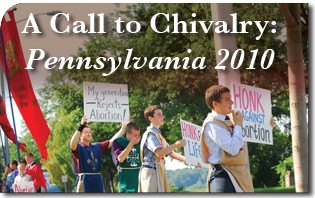 In times of crisis, there are two types of people: those who let their heads fall and give up and those who rise up and change the course of history. In 1383, Portugal was on the verge of losing her independence, consequently challenging Our Lord’s will for that country.
In times of crisis, there are two types of people: those who let their heads fall and give up and those who rise up and change the course of history. In 1383, Portugal was on the verge of losing her independence, consequently challenging Our Lord’s will for that country.
King John of Castile, upon the death of the heirless Fernando of Portugal, sought to usurp the throne of Portugal. Everything seemed to favor his succession and the way clear: he married Fernando’s widow, possessed a great and powerful army and he had the submission of much of the Portuguese nobility. He was very wrong. A 22-year-old knight stood in his way. While still a teenager, he fended off with only a spear a host of bandits from pillaging and burning a village This young man led the Portuguese armies into battle against great odds and defeated his Castilian adversary time and again. Even when all seemed to be lost, he was always victorious.
At 23, he became the Constable of Portugal, effectively becoming the commander of all Portugal.
He always led from the front, displaying courage, boldness, and an outstanding facility for military prowess. This knight was able to throw a spear straight across a river, hitting his target. When old with white hair, he still wore his armor underneath his Carmelite habit and still able to wield a sword to the consternation of his enemies. His very name struck fear into the enemy. Above all, he was a devoted slave and son of Our Lady.
He prayed the rosary, created institutions to honor Her and Her Divine Son in the Most Blessed Sacrament of the Altar, practiced generosity and purity to a heroic degree; his army easily was the most virtuous and most combative. Properly styled the Holy Constable of Portugal, he was first a son of Our Lady. This man is Saint Nuno Alvarez Pereira.
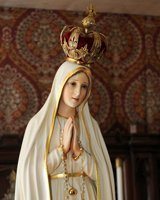
This is the model that was presented to the young men who attended this year’s Call to Chivalry Summer Camp in Herndon, Pennsylvania. The theme this year was Portugal, a small country on the east coast of the Iberian Peninsula.
However, its size should be measured by the grandeur of its soul, not by miles or population; meaning, the services it rendered to God and Our Lady was not proportional to its size. The camp participants had the privilege of listening to tales of heroism, sacrifice, and boldness through meetings given by the camp counselors. King Alfonso Henriques, Portugal’s first king, conquered this small territory from the Moslems, spurred on by the blessing of Saint Bernard during the Second Crusade. More importantly, he received an order from Our Lord Himself to found a kingdom because it would have a special part to play in His work. However, Portugal must remain always faithful and not sell Him like Judas did.
This valiant king faced five Moslem kings by himself with his army and crushed them. When Portuguese independence was at stake, Saint Nuno Alvarez, that holy and war-like constable, saved his country from losing its right as a free kingdom and preserving the pact established by Jesus Christ. Prince Henry the Navigator was the man who gave life to sea exploration. Through his insistence and confidence, the Cape of Good Hope was rounded for the first time in history by a European, although he did not sail around it himself.
Also very important to in the history of Portugal were the apparitions of Our Lady at Fatima. There, she asked mankind to convert, pray the rosary, and make reparation to avoid punishment. As a matter of fact, the International Pilgrim Statue of Our Lady of Fatima that cried in New Orleans in 1972 visited the camp for the second time in a row — a great honor for the camp and the boys. An all–night vigil was held to keep her company and safe. What a wonderful way to begin the camp!
Since man is made of body and soul, outdoor games enabled the participants to exercise their prowess and knightly spirit. Games like shield
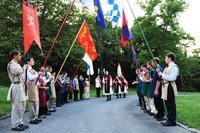
ball and dodge ball challenged their abilities in order to either dexterously knock down the enemy shield or nimbly dodge an oncoming ball. The camaraderie during the games, as well as at the meals and elsewhere, was very present. During the games, shouts of invocations to the saints like “Saint Louis the Crusader!” were answered by “Pray for us!”
This year, the camp participated in various rope courses. In order to properly overcome an obstacle or accomplish a specified goal, the boys had to work as a team. They also learned how to use their heads to finish seemingly impossible obstacles. For instance, one group had to make their way onto a platform without touching the ground, and all they had were two boards. However, they were both too short in reaching the platforms. What was the outcome? Through leverage, the boys figured out that the boards can rest on each other while someone stands on one end.
As for the high ropes, they challenged the fears any had for heights or their confidence in their abilities. One young man, a little intimidated by the ropes’ heights, mustered up his courage by declaring “This won’t scare me! I’m in a daring mood!” He succeeded. Hiking up Hawk Mountain was another activity.
While making their way up to the summit, the boys sang and gave each other words of encouragement, and there was even an inspiring talk about Saint Ignatius Loyola while dinner was being prepared on the mountain. A treasure hunt added another flavor to the rough and tumble of the games. Having to work together and fighting to keep up morale, each team had to endure the constant running, put their thinking caps on, and use their imagination. To the victors go the spoils, so a huge chest full of candy was awarded to the winning team.
Although protesting against abortion is not a game and something very serious, it is an application of what they learned during the meetings and very much according to the camp’s theme, chivalry.
The code of chivalry states that the knight must defend the weak, and an unborn child is perhaps the most helpless. The participants, armed with their rosaries and the signs they made the night before such as “Your mom chose life,” and “Honk against abortion,” fought for life in front of an abortion clinic. There were with honks, words of encouragement, and many thumbs up. As Saint Nuno defended his country from injustice and tyranny, the Call to Chivalry participants likewise defended the unborn.
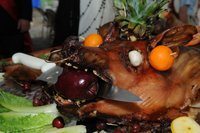
The last day of the camp was the climax, because this is the day of the medieval games are held and of the marvelous medieval banquet. Utilizing the lessons learned throughout the camp and putting themselves to the test, the young men charged into the games with verve and flare. Each team worked hard, both as a unit and as individuals. The spirit of chivalry was felt strongly in the air. When the games finished, there were the obstacle course and archery to tackle. Hand–walking across a rope, crawling through a swinging tunnel, tossing spears with careful dexterity to hit the target, traversing a bridge while avoiding a tumble into a water–filled moat, running through different obstacles, and finally ringing the bell, announcing their arrival and for the next person to go.
While still weary from this, each person had to compete at the archery station. After the mayhem, there was the final rosary procession, with the participants wearing their medieval-style scapulars, bearing colorful banners floating in the air, and Our Lady, as regal as ever, carried on a litter. It was a scene from the tales of chivalry, like the Song of Roland and other illustrious knights, seeing lions and crosses on the young men’s chests, holding rosaries, and praying in a manly way, heads high and keeping in line.
Our Lady was the jewel of this procession. Like her most faithful son Saint Nuno, the participants prayed to her and honored her as good sons should. The procession ended with the Salve Regina hymn being sung as they entered the tent where the final banquet was held. Amid candlelight and lively accounts of the camp, a roasted pig was brought in with trumpet blasts and cheers of joy. The dessert was in the form of a castle cake. Only those with stout hearts and appetites would be successful in overcoming this last obstacle.
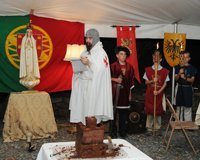
However, life is not all fun and games. Just as the banquet was to end, a squire announced the arrival of a Templar knight. This bearded knight announced the call to defend Holy Mother Church.
What is needed today is chivalry, other men like Saint Nuno. Despite the odds these young men must face, they must be knights of purity and honor, like Saint Nuno. They must have greater devotion to Our Lady. The Templar made a call to chivalry.
As this camp began, so it ended. Our Lady, Mary Most Holy, left her mark on all hearts.

